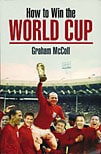 by Graham McColl
by Graham McColl
Bantam Press, £12.99
Reviewed by Jonathan O'Brien
From WSC 280 June 2010
By the law of averages, a sizeable number of you who are reading this will be having a flutter on the World Cup. So, before you put your money down on Spain (who are forever only one Sergio Ramos backpass away from potential disaster), or Brazil (whose star playmaker has endured a poor season), or even England, have a leaf through this entertaining look back through World Cup history that passes itself off as an instruction manual for managers hoping to bring home the big one.
In 14 chapters, Graham McColl lays out what's required. If your country's press are hammering you, use the bad coverage to create an us-against-them attitude. A slow start in the group matches isn't the end of the world. Don't be afraid to sideline a talented player if he won't work for the team. And lose a couple of games in the qualifiers if you can afford it, too. The team that is expected in late May to stroll to victory has almost invariably fallen short by early July – 1970 and 1994 stand out among the last ten World Cups as the only tournaments where the prior favourites prevailed. In all the others, the fancied horses either suffered a collective nervous breakdown, drank deep from their own publicity, had their weak point exposed (usually defence) or were screwed over by a referee at a crucial moment.
As is pointed out here, not too many people fancied Italy four years ago. The Italians were a classic of the genre, their triumph incorporating elements of pre-competition scandal, low domestic expectations, tactical adaptability, siege mentality and impeccable preparation – a mix of ingredients that crops up time and again in the histories of the tournament's winners.
McColl unearths a number of diverting stories that this particular World Cup anorak had never come across before, including that of Mozart di Giorgio, the Brazilian FA fixer who made sure Garrincha played in the 1962 final by bribing a linesman, and of Andy Auld, the USA's midfield star who was blinded with smelling salts by an Argentinian in the 1930 semi-final. But some of his theories seem more doubtful than others. One chapter is entitled "Have A Mad Manager", but of the last ten coaches to win the trophy, only two – Carlos Bilardo and Big Phil Scolari – fit the description of a bawling, brawling martinet (Helmut Schön's 1974 breakdown was a brief stress episode rather than serial behaviour). More often than not, the winning manager is a level-headed technocrat like Enzo Bearzot, Franz Beckenbauer or Carlos Alberto Parreira.
In the final chapter, drawing rather forced parallels between Alf Ramsey and Fabio Capello, McColl predicts England will "come good at last" (ie win it) and likens them to Italy's 2006 side, even though they have no convincing keeper, off-form defenders, two midfield kingpins who've failed to deliver at international level for years and a huge reliance on a striker coming back from injury.
The chapter, mercifully brief, reads as if McColl (who is Scottish) threw it in there simply to tell the English market what it wants to hear. Still, this will help pass the time nicely as you wait for Switzerland v Honduras to kick off.